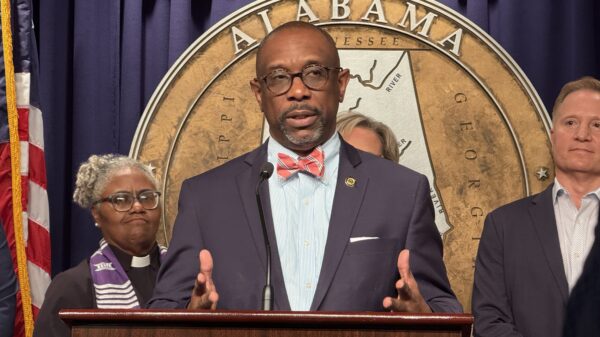New reporting from AL.com reveals the dire state of dental care in Alabama. At 41.6 dentists per 100,000 residents, Alabama has the nation’s second-lowest ratio of dentists per population, only ahead of Arkansas. The national average is about 60 dentists per 100,000 residents.
“The access to care in Alabama is worse than any state I’ve ever practiced in,” Carson Cruise, a pediatric dentist in Florence, told AL.com. “Mississippi is usually the worst at everything when it comes to health metrics. But if Mississippi is the floor, Alabama brought a shovel.”
According to the report, some patients have to wait up to a year for oral surgeries while Alabama’s dentists struggle to stay in business. Of those affected by Alabama’s shortage of dental care, children, people with disabilities, and rural residents are hit the hardest.
The rural Greene and Clay Counties have no dental providers whatsoever, while 18 other counties are close to losing all or most of their providers to retirement.
“This situation puts many Alabama counties at risk of losing vital dental services in the near future,” reads an August report from the Alabama Department of Public Health. “The oral health disease burden in Alabama presents a pressing challenge that necessitates immediate attention.”
Cruise told AL.com that the biggest challenge for dentists in the state is low insurance reimbursement rates, particularly from the state Medicaid agency. With expenses increasing and little reimbursement from the state, Cruise says that his practice is struggling despite seeing a high number of patients — some driving over two hours to Florence for their appointments.
“When you look at the number of patients I have, I’m doing great. We get north of 100 new patients a month,” Cruise told AL.com. “But if you look at the amount of money the business collects, expenses have gone up so much that what goes in my pocket is about 10% less than what it was three years ago.”
Some practices have even stopped accepting Medicaid, as they are unable to afford to treat those patients. Meanwhile, more than 50% of children in Alabama are on Medicaid, exacerbating the dental crisis among the state’s youth.
According to Cruise, it took his practice four years to get access to a hospital that could accomodate surgeries requiring anesthesia. This was also due to the state’s low Medicaid reimbursement rate, whereby hospitals would be losing money if they gave Cruise the privileges to operate.
The problem is not one faced just in Alabama, with the Centers for Medicare and Medicaid Services deciding to increase their reimbursement for dental procedures at hospitals across the country from $200 to $2,000 this year.
However, Alabama is unique in that it is the only state in the country that doesn’t provide any dental coverage for adults on Medicaid. Those over the age of 21 are forced to turn to private insurance for dental coverage or are left to cover costs entirely out of pocket. The only exception to this rule is that pregnant adult Medicaid recipients may seek dental coverage through 60 days postpartum.
If you are over 21 with a disability that prohibits you from working, you may find yourself paying for your dental treatment with your social security checks, according to Stephen Mitchell, an associate professor in the UAB School of Dentistry.
When costs become too prohibitive, patients are unable to get the recommended preventitive care they need and can end up having their teeth pulled for what would have been treatable conditions under different financial circumstances.
AL.com reached out to a spokesperson for Alabama Medicaid who declined to answer questions about the state’s lack of dental coverage for adults. Nearly 300,000 Alabamians have been culled from Medicaid this year after the expiration of pandemic-related federal protections that prohibited states from removing people from the program. This Medicaid ‘unwinding’ will further reduce the already limited pool of young or pregnant Alabamians who might have been able to receive some dental coverage assistance through the program.
However, earlier this year, the Alabama State Legislature entertained discussions of a potential Medicaid expansion. Arkansas expanded its Medicaid coverage in 2014, while North Carolina did the same in 2023. The proposed expansion would extend coverage to around 100,000 Alabamians who currently make too much income to qualify for Medicaid but too little to afford private insurance or receive subsidies for Affordable Care Act plans. As of today, Alabama remains one of only 10 states who have not expanded Medicaid to address the so-called “coverage gap.”
In February, the Alabama House of Representatives passed a gambling bill, part of which would allow the state to use gambling money as funds for a “rural health care” program containing elements of Medicaid expansion. However, Senators like Finance and Taxation General Fund Committee Chair Greg Albritton, R-Atmore, stripped that language from the bill in March and remain opposed to Medicaid expansion despite pleas from hospitals and advocacy groups. Although these discussions have not revolved around dental care, it is plausible that a general Medicaid expansion would also include greater access to dental coverage and possibly even higher reimbursements for providers.
ADPH has reported that limited access to dental care combined with a growing disabled population and a lack of adequate insurance coverage “will place a burden on Alabama’s oral health system in the next decades more than ever experienced in the past.”


















































